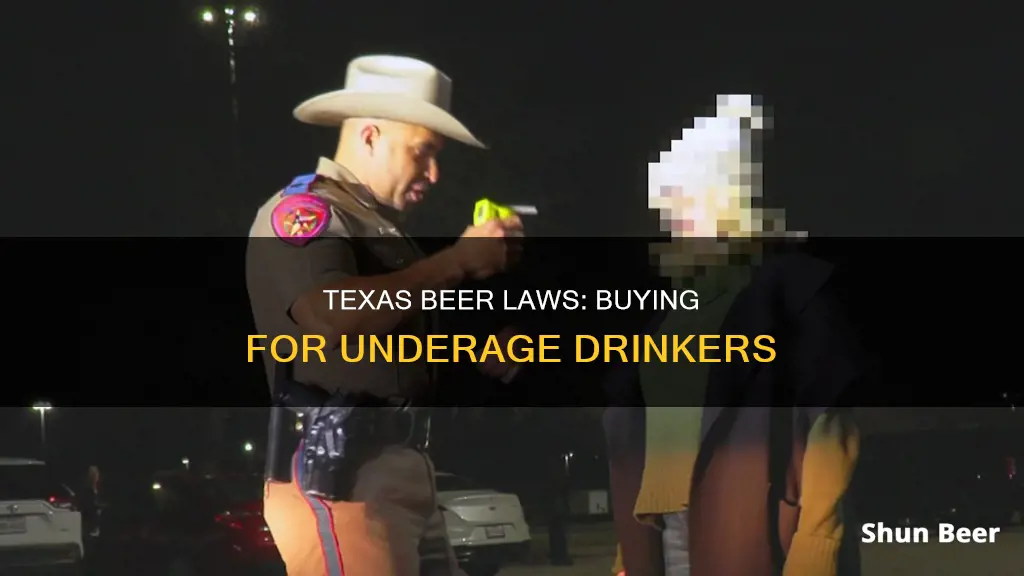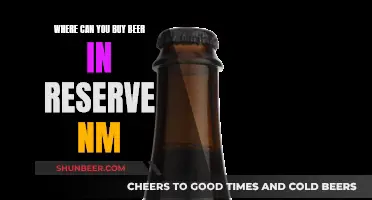
Texas has strict laws regarding the sale and consumption of alcohol. To legally consume alcoholic beverages in the state of Texas, one must be at least 21 years old, with certain exceptions. Texas is one of ten states that allow consumption by minors in the presence of supervising family members or a spouse. However, providing alcohol to a minor in Texas has serious consequences and is considered a class A misdemeanour. Minors who attempt to buy, possess or drink alcoholic beverages face penalties such as fines, community service, and suspension of their driver's license.
| Characteristics | Values |
|---|---|
| Minimum age to buy beer | 21 years old |
| Minimum age to drink beer | 21 years old |
| Minimum age to work at a company serving alcoholic beverages | 18 years old |
| Minimum age to work at a package store | 21 years old |
| Minimum age to work at a wine-only package store | 16 years old |
| Minimum age to work at a bar or restaurant | 18 years old |
| Minimum age to enter a licensed or permitted premises | No minimum age, unless it's a package store |
| Minimum age to possess an alcoholic beverage | No minimum age if in the visible presence of an adult parent, guardian, or spouse |
What You'll Learn

Minors can drink with family members' consent
In Texas, a minor (under 21) can drink alcohol with family members' consent. An adult may provide alcohol to a minor if they are the minor's adult parent, guardian, or spouse and are visibly present when the minor possesses or consumes the alcoholic beverage.
Texas is one of ten states that allow consumption by minors in the presence of consenting and supervising family members. The other states are California, Colorado, Maryland, Montana, New York, West Virginia, Washington, Wisconsin, and Wyoming.
However, it is against the law to make alcohol available to a non-family member under 17, even on one's own property and with permission from the minor's parent. Texas holds parents/adults civilly liable for damages caused by the intoxication of a minor younger than 17 if they knowingly provided alcohol or allowed alcohol to be served on property owned or leased by them.
The consequences for providing alcohol to a minor in Texas include a fine of up to $4,000, confinement in jail for up to a year, or both. Additionally, the driver's license of the person providing the alcohol would be automatically suspended for 180 days upon conviction.
It is important to note that the legal drinking age in Texas is 21, and providing alcohol to a minor or drinking as a minor can result in legal consequences, including fines, community service, and driver's license suspension.
Buying Beer in Egypt: What's the Deal?
You may want to see also

Minors can drink in a bar/restaurant with parental supervision
In Texas, a person must be at least 21 years old to legally consume alcohol, with certain exceptions. Texas is one of ten states that allow for the consumption of alcohol by minors in the presence of supervising family members. This means that a minor can drink in a bar or restaurant with parental supervision.
According to Texas law, parents accept responsibility for the safety of minors under 15 when the minor is on their property or property leased by them and under their care, custody, and control. An adult may provide alcohol to a minor if they are the minor's adult parent, guardian, or spouse and are visibly present when the minor possesses or consumes the alcoholic beverage.
It is important to note that it is against the law to make alcohol available to a non-family member who is younger than 17, even on one's own property and with permission from the minor's parent. Texas holds parents and adults civilly liable for damages caused by the intoxication of a minor younger than 17 if they knowingly provided alcohol or allowed the minor to be served alcohol on their property.
Additionally, there are consequences for minors who buy, attempt to buy, possess, or drink alcoholic beverages. These consequences include a Class C misdemeanor, punishable by a fine of up to $500, attendance of an alcohol awareness class, community service, and loss or denial of a driver's license.
While Texas law allows for minors to drink in the presence of supervising family members, it is crucial to be aware of the responsibilities and potential consequences associated with providing alcohol to minors.
Grolsch Beer: Where to Buy and What to Know
You may want to see also

Minors can face a Class C misdemeanor for buying alcohol
In Texas, a person must be at least 21 years old to legally consume alcohol, with certain exceptions. Minors who buy, attempt to buy, or drink alcoholic beverages can face a Class C misdemeanour, punishable by a fine of up to $500. This is a strict liability offence, meaning that the minor can be charged regardless of whether they knew they were committing an offence.
The consequences of a minor's first offence of drinking under the influence of alcohol include:
- A Class C misdemeanour, punishable by a fine of up to $500.
- Attendance of an alcohol awareness class.
- 20 to 40 hours of mandatory community service.
- 60-day driver's license suspension and no eligibility for an occupational license for the first 30 days.
The penalties increase for second and third offences, with a third offence resulting in a fine of $500 to $2,000, confinement in jail for up to 180 days, or both. Additionally, minors with previous alcohol-related convictions will have their driver's license suspended for one year if they do not attend alcohol awareness training.
It is important to note that Texas law also imposes civil liability on parents or adults who provide alcohol to minors. If a minor under 17 years of age consumes alcohol on their property, the parent or adult can be held responsible for any damages caused by the minor's intoxication. This includes injuries, property damage, or other harmful consequences resulting from the minor's consumption of alcohol.
Therefore, it is essential for minors to understand the legal consequences of purchasing or consuming alcohol in Texas. The penalties can have a significant impact on their lives, including fines, community service, and the loss of driving privileges.
Buying Beer in Indiana: Current Legal Status
You may want to see also

Adults face consequences for providing alcohol to minors
In Texas, it is illegal to provide alcohol to a minor if you are over the age of 21 and are not their parent, guardian, or spouse. The state of Texas holds parents and adults civilly liable for damages caused by the intoxication of a minor younger than 17 if they knowingly provided alcohol or allowed alcohol to be served on property owned or leased by them.
If a minor is injured or dies as a result of drinking on the property, gets into a fight, falls and hurts themselves, or is sexually assaulted, damages someone else's property, or leaves the property and is involved in a motor vehicle accident causing injury to themselves or others, the adult who provided the alcohol can be held responsible.
Making alcoholic beverages available to a minor is a class A misdemeanour, punishable by a fine of up to $4,000, confinement in jail for up to a year, or both. Additionally, the offender's driver's license would be automatically suspended for 180 days upon conviction.
It is important to note that Texas law allows for minors to consume alcohol in the presence of consenting and supervising family members, such as parents, guardians, or spouses. In this case, the minor must be at least 15-17 years of age, and the adult must be visibly present when the minor possesses or consumes the alcoholic beverage.
EBT Card Beer Purchases: Non-Alcoholic Options
You may want to see also

Minors can work in alcohol-serving establishments from age 18
In Texas, it is illegal to buy, attempt to buy, possess, or drink alcoholic beverages if you are under 21. If a minor is caught drinking alcohol, they can face a Class C misdemeanour charge, a fine of up to $500, attendance of an alcohol awareness class, and up to 40 hours of community service.
However, Texas law does allow for minors to work in alcohol-serving establishments from the age of 18. According to the Texas Alcoholic Beverage Code, employees aged 18 or over who serve alcohol are not legally liable for their actions (such as serving alcohol to an intoxicated patron) if:
- The employer requires the employee to complete training approved by the Texas Alcoholic Beverage Commission.
- The employee completes the required training.
- The employer has not directly encouraged the employee to violate the law.
In other words, a minor aged 18 or over can work in a bar or restaurant serving alcohol, but their employer must ensure they are properly trained and certified by the Texas Alcoholic Beverage Commission. This helps to ensure that minors who work in establishments serving alcohol are educated about the responsible service of alcohol and are not encouraged to break the law.
Best Beer Bong Retailers: Where to Buy Them?
You may want to see also
Frequently asked questions
You must be 21 years old to legally drink alcohol in Texas.
In Texas, adults may provide alcohol to minors if they are the minor's adult parent, guardian, or spouse, and are visibly present when the minor possesses or consumes the alcoholic beverage. It is against the law to make alcohol available to a non-family person younger than 17, even on one's own property and even with permission from a parent of that person.
If you’re a minor who buys, attempts to buy, possesses or drinks alcoholic beverages, you may face a Class C misdemeanor, punishable by a fine of up to $500, attendance of an alcohol awareness class, 8 to 40 hours of community service, and a 30- to 180-day loss or denial of your driver's license.
Making alcoholic beverages available to a minor in Texas is a class A misdemeanor, punishable by a fine of up to $4,000, confinement in jail for up to a year, or both. The violator's driver's license will also be automatically suspended for 180 days upon conviction.
Minors are generally allowed to enter licensed or permitted premises as long as they do not possess or consume alcoholic beverages. However, they may not enter the premises of a liquor store (also known as a package store) unless accompanied by an adult parent, spouse, or guardian.







